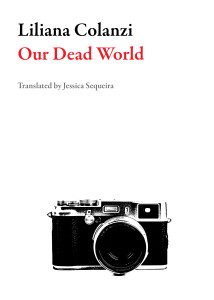 translated by Jessica Sequeira
translated by Jessica Sequeira
May 26, 2017
120 pages
The eight short-yet-powerful stories that make up this collection reveal an intriguing new voice in translated fiction, in general, and speculative fiction, in particular. Each piece is unnerving in its own unique way, whether it deals with a lonely colony on Mars, a a psychopathic cannibal in Paris, or a girl pushed into a nervous breakdown by her fanatical mother. And while some of these stories skirt the boundaries of “speculative fiction,” they all hold up a warped mirror to reality, inviting us to question how we perceive that very reality every day.
One main theme running through Our Dead World is the collision between the natural/ordinary and the unnatural/bizarre/unexplained. A colonist on Mars sees deer running past, a group of children experience the shock of a friend’s death, a young boy may or may not have been taken by aliens with the coming of a meteorite, a girl senses a strange “wave” that drives people to commit suicide. Colanzi’s narrative voice is perfectly poised and unapologetically mischievous, refusing to let the reader guess what twists and turns may lie ahead.
Of these eight stories, my favorites have to be “Meteorite” and “Our Dead World.” The former opens with a brilliant paragraph reminiscent of the start of Wells’s The War of the Worlds:
The meteoroid traced the same orbit in the solar system for fifteen million years until the movement of a comet pushed it toward Earth. Even so, it took another twenty thousand more years before it collided with the planet, during which time the world passed through an ice age, mountains shifted and the waves gave landmasses a new shape. Innumerable life forms died out forever, while others battled ferociously, adapted and repopulated Earth. When the object at last entered the atmosphere, the pressure of the shock reduced it to an explosion of blazing fragments that were consumed before they hit the ground. The essence of the meteorite survived the violent disintegration; the igneous ball, a meter and a half in diameter, fell on the outskirts of San Borja. Its spectacular descent from the heavens was witnessed by a couple at home, arguing at five-thirty in the morning.” (39)
The narrative lens zooms us in toward this arguing couple along the same trajectory as the meteorite, as if we readers are the meteorite, falling to Earth an an incredible speed toward a specific point. Once it “collides” with the Earth, though, the narrative speed slows down drastically, as we jump into the mind of one man (Ruddy) whose insomnia and hyperactivity, caused by diet pills, are making him irritable and paranoid. Soon we learn about the young boy who had only recently begun working at Ruddy’s farm and was seriously injured. The boy’s earlier comments about fire coming out of the sky and his own “gifts” take on a whole new meaning once the meteorite hits and the boy disappears.
In “Our Dead World,” a woman fleeing from painful memories on Earth begins seeing visions while helping set up a colony on Mars. After one colonist commits suicide, she starts to understand just how alone she and her colleagues really are. Woven in with her thoughts about the mission are the woman’s memories of her pregnancy and painful breakup back home. Hope and despair intertwine in this piece and leave the reader with more questions than answers.
Our Dead World is a fascinating read and worth checking out.
